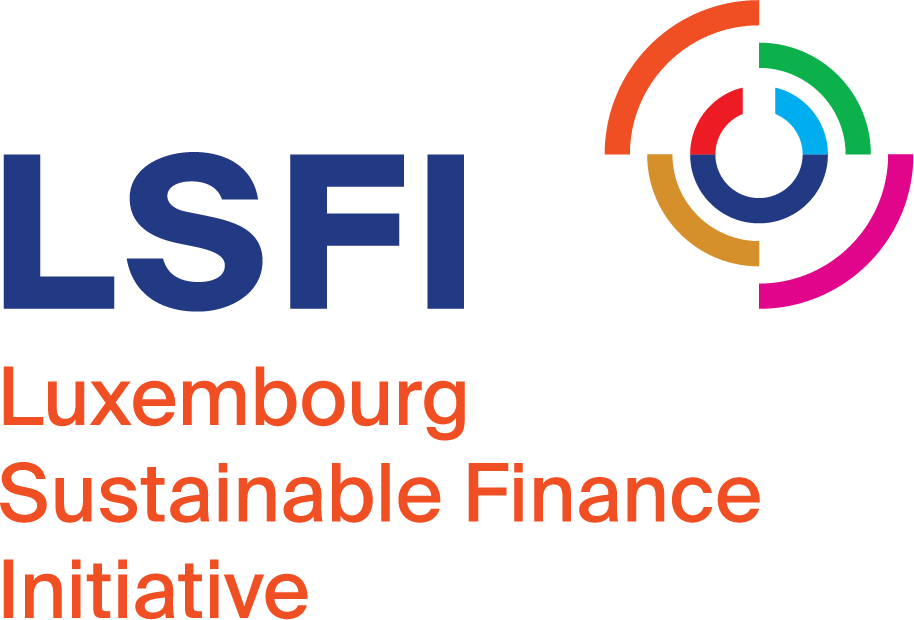Executive Summary
Coordinating Activities
2023 LSFI Stakeholder Assembly
Follow-up & LSFI Upcoming Activities
The Luxembourg Sustainable Finance Initiative (LSFI) organised in July 2023 its second Stakeholder Assembly. This forum gathered players from different sectors with the aim to:
- Inform about LSFI’s ongoing and upcoming activities and projects;
- Foster synergies among the LSFI stakeholders by discussing activities, priorities and challenges in sustainable finance.
Understanding its stakeholders’ main areas of work and needs is central for the LSFI to develop its mission of raising awareness and helping the financial sector transition towards sustainability.
Going forward, the LSFI will focus on supporting its stakeholders to address some of the shared key challenges by providing regulatory updates, fostering coordination, and underpinning the difficulties around ESG data, among others.
This document exposes the priorities and challenges outlined by the LSFI stakeholders and the LSFI responses. This work aims to help the financial sector to efficiently shift towards sustainable finance, positioning Luxembourg as a key player in the space and achieving the much-needed transition.
About the LSFI Stakeholder Assembly
The 2023 LSFI Stakeholder Assembly brought together representatives of 24 organisations from the financial industry, inclusive finance, research and education, corporates, civil society and public bodies. The Luxembourg Minister of Finance, H.E. Yuriko Bakes, and the Luxembourg Minister for the Environment, Climate and Sustainable Development, H.E. Joëlle Welfring, also participated in the Assembly.
During this meeting, the LSFI presented its key activities of the past year, as well as projects that will be developed over the following months (further information below). The participants also had the opportunity to present their main priorities and challenges in sustainable finance.
Stakeholders’ Priorities and Challenges
While the stakeholders raised various topics[1], the most mentioned ones are outlined below. This section only includes those that are within the LSFI remit.
- Regulation represents one of the most significant difficulties for the stakeholders. Among others, the following issues were raised: implementation of regulatory requirements, continuous increase of new publications and related requirements, not synchronised regulatory timelines and implementation periods, lack of data and standardisation in reporting, and lack of consistency and usability of the current regulatory framework. The need for regulatory convergence and help in following and staying up to date on this matter was also mentioned.
- Coordination was repeatedly mentioned as a key pillar for fostering sustainable finance. In particular, gathering actors and supporting dialogue across sectors and industries, sharing expertise and best practices, avoiding duplications, and co-creating knowledge are considered priorities. Co-organising activities (e.g., networking and events) was also highlighted as necessary.
- Data is a prevailing challenge, including: lack of data on different themes (e.g., climate data), at multiple levels (e.g., at the project or company level), and for certain geographies and markets (e.g., emerging markets). Lack of reliable data and difficulties in measuring and reporting were also mentioned.
- Training and capacity building remain a difficulty ranging from further need to educate and upskill professionals at all levels (from the board of directors to more junior profiles) on sustainable finance-related fields to facilitating and promoting talent attraction.
- Access to resources and toolkits that can help unravel the sector’s challenges and priorities was requested. For instance, learning from past or similar contexts and benefiting from already established best practices.
- Access to resources and toolkits that can help unravel the sector’s challenges and priorities was requested. For instance, learning from past or similar contexts and benefiting from already established best practices.
- Awareness Raising continues to be pivotal to increasing industry engagement and responsibility.
- Establishing a Luxembourg Scientific Advisory Board to support and guide LSFI and the Luxembourg financial industry decisions was also proposed as a priority.
- Updating the Luxembourg Sustainable Finance Strategy was also requested by some stakeholders.
[1] During the LSFI Stakeholder Assembly all the participants had the opportunity to present the priorities and challenges of their organisations. Out of the 24 organisations which attended, 20 presented.
Follow-up & LSFI Upcoming Activities
In the section below, the LSFI describes the key activities that will be performed throughout 2023 and 2024, aiming to respond and address the priorities and challenges revealed by its stakeholders as indicated above.
These activities outline the main priorities and central areas of work, in line with the LSFI Action Plan and mission; however, they do not encompass all that the LSFI develops.
Regulation
The LSFI is not a regulatory, public affairs or advisory entity, and thus does not comment or issue statements on the regulation. However, following our awareness-raising mission, the LSFI follows and informs neutrally about the latest EU and Luxembourg regulatory updates on our website, newsletter and social media and organises webinars.
In addition, LSFI launched, just after the Assembly, a website section on EU sustainable finance regulation dedicated to help financial professionals understand and stay up to date on this topic in a simplified way. French and German versions will be launched and a new page on IDD developed in the next months.
Coordination
To foster coordination and synergies and help the sector advance at speed, the LSFI acts as a central point of contact among all sustainable finance actors. In particular, LSFI holds regular operating committees within industries; has continuous bilateral exchanges with its stakeholders such as the financial associations, companies representatives, civil society and other sustainable finance actors; runs cross-sectoral working groups; and occasionally organises roundtables.
In addition, the LSFI will also:
- Coordinate the Women in Finance Charter data collection and reporting.
- Actively participate in industry working groups.
- Take part at the international level in forums and networks, such as Eurosif and FC4S, with the twofold aim of representing and showcasing Luxembourg, and exploring best practices across jurisdictions.
Data & Measuring Progress
The LSFI is currently running a working group focused on Climate Measurement and Reporting to analyse and propose practical climate measurement and reporting tools and methodologies for Luxembourg financial institutions. Its outcome is expected to be released in Q4 2023.
In addition, the LSFI will:
- Contribute to upskilling and guiding the financial industry in its decarbonisation pathway with the support of the conclusions of the above-mentioned working group.
- Run in Q4 2023 the ESG Data working group. It will focus on addressing ESG data challenges by providing explanations and sector guidance.
- Conduct the 2023 Luxembourg Sustainable Finance Study to be published in Q4 2023. The study will update the data points covered in the 2022 edition and enlarge its scope following the increased data availability and the latest regulatory and market updates.
Training and Upskilling
The LSFI has run a working group on Training and Education to strengthen Luxembourg’s financial sector players’ sustainable finance skills and competencies on sustainable finance. The working group members reached their first conclusion in June 2023. The whitepaper “Sustainable Finance Training Needs & Gap Analysis in the Luxembourg Financial Sector” describes the analysis and the findings of the working group research.
We also collaborate with Luxembourg education and research centres, acting as a connecting entity between academia, research and industry (dedicated meetings, webinars, joint projects…).
To strengthen its activities in this regard, the LSFI will also:
- Support the financial sector and the training institutions to cover the identified training gaps existent in Luxembourg, such as “How to sell and/or market an ESG product?”, “Impact Investing, Inclusive Finance, and Blended Capital”.
- Reconvene the Education and Training working group in six months to ensure its outcome’s accuracy and follow developments in the training market.
- Continue updating the LSFI Take Action section on Training every 6 months (see Toolkits and Knowledge sharing section for more information).
Toolkits & Knowledge Sharing
The LSFI has an online toolkit called Take Action dedicated to instruments, training and regulation on its website. The toolkit aims to provide useful and structured information in a comprehensive but easily accessible way[2]. The LSFI also publishes whitepapers to nurture a knowledgeable sustainable finance community (e.g., blended finance).
Going forward, the LSFI will:
- Keep the LSFI Take Action Instruments and Training toolkit updated every 6 months; and the regulation part as new updates emerge.
- Develop new sections within the Take Action toolkit on labels, retail investing and blended finance.
- Issue whitepaper on Biodiversity (following the Masterclass planned in November).
- Organise masterclasses to upskill Luxembourg financial professionals, providing practical support to challenges and gaps on Biodiversity and Human Rights, among others.
[1] In particular, the Instruments section provides a unique and comprehensive list of Initiatives, Frameworks, Standards and Tools that can support the financial sector’s transition. The Training section includes a list of sustainable finance training in Luxembourg and neighbouring countries; and the Regulation one provides an overview of seven major sustainable finance legislative pieces, giving definitions, responding to key questions and gathering dates and links.
Awareness Raising
The LSFI constantly engages in awareness raising activities independently or in partnership with various stakeholders and is open to further collaborations.
The LSFI will continue developing the below awareness-raising activities:
- Maintain relevant sources of information, such as the website, newsletter or LinkedIn page, by weekly gathering news, events, regulatory updates and publications.
- Organise and co-organise awareness-raising sessions on sustainable finance across different sectors and targets such as schools, companies and start-ups.
- Organise and co-organise technical webinars targeting financial professionals. The LSFI partners with the University of Luxembourg, and is open to further collaborations.
- Participate in presentations, speaking slots and conferences, both at national and international level.
Scientific Advisory Board (SAB)
In the following months, the LSFI will explore the possibility of assuming the coordination of the Luxembourg Scientific Advisory Board currently hosted by Spuerkeess. It is under discussion what the next steps will be to ensure the best governance is set. The SAB aims to leverage a knowledgeable and experienced community of scientists to advance sustainable finance.
LSFI Strategy Review
The Luxembourg Sustainable Finance Strategy was published in February 2021, and the LSFI is currently focused on implementing its action plan, particularly the medium-term objectives. The Strategy/LSFI Action Plan update is foreseen in the mid-term (2024).
Conclusion
Through its past and coming work, the LSFI aims to help the financial sector transition, raise awareness and foster collaboration and regular dialogue among all the stakeholders which compose the Luxembourg sustainable finance landscape (financial institutions, public bodies, civil society, research and education, and corporates, among others).
We envisage that working on the abovementioned topics will help advance sustainable finance in Luxembourg, find a key differentiator for the country, and face challenges. To successfully deliver this mission, collaboration and involvement of all the different stakeholders will be central for the Luxembourg Sustainable Finance Initiative.

Annexe
Stakeholder Assembly Attendees list
| Organization |
| Appui au Développement Autonome (ADA) |
| Association des Banques et des Banquiers du Luxembourg (ABBL) |
| Association des Compagnies d’Assurance et de Réassurance (ACA) |
| Association Luxembourgeoise des Fonds d’Investissement (ALFI) |
| European Investment Bank (EIB) |
| Chambre de commerce |
| Commissariat aux Assurances (CAA) |
| Commission de Surveillance du Secteur Financier (CSSF) |
| Commission Luxembourgeoise Justice et Paix (J&P) |
| Etika |
| Inclusive Finance Network (InFiNe) |
| Inspiring More Sustainability (IMS) |
| Institut Luxembourgeois des Administrateurs (ILA) |
| International Climate Finance Accelerator (ICFA) |
| Investing for Development (I4D) |
| Luxembourg Finance Labelling Agency (LuxFLAG) |
| Luxembourg for Finance (LFF) |
| Luxembourg House of FinTech (LHoFT) |
| Luxembourg Institute of Science and Technology (LIST) |
| Luxembourg Private Equity Association (LPEA) |
| Ministry of Environment, Climate and Sustainable Development |
| Ministry of Finance |
| Social Performance Task Force (SPTF) |
| Spuerkeess Scientific Advisory Board (SAB) |
| University of Luxembourg |
Supporting Documentation & Links
- LSFI Website: Access
- LSFI Take Action Toolkit – Instruments: Access
- LSFI Take Action Toolkit – Training: Access
- LSFI Take Action Toolkit – Regulation: Access
- LSFI Working Groups dedicates website: Access
- LSFI Study “Sustainable Finance in Luxembourg – A quantitative and qualitative overview”: Access
- LSFI 2021 Annual Report: Access
- LSFI 2022 Annual Report: Access
Disclaimer
The above document is the official follow-up of the second LSFI Stakeholder Assembly that took place on 4th July. It outlines the main activities that the Initiative will perform throughout 2023 and 2024 in response to Stakeholders’ priorities and challenges, as well as following an extensive mapping of the sustainable finance ecosystem; it also aims to address existing gaps. It is also a working document that will be adapted to the needs. Should other priorities arise, the foreseen timelines and deadlines might be modified on exceptional occasions. This document can be publicly distributed.

